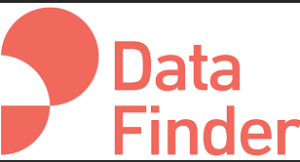Data Finder
In today’s world of data-driven decision-making, finding the right tools to access, analyze, and manage data is crucial. One such tool that has gained prominence is Data Finder. Whether you are a business owner, marketer, or researcher, managing large datasets efficiently is often challenging. Data Finder helps solve this problem by providing an easy-to-use platform designed to locate and organize data across various domains. This review will dive deep into the features, specialties, use cases, and pros and cons of Data Finder, giving you a clear picture of whether this tool fits your needs.

Features of Data Finder
Data Finder offers a range of robust features designed to make data discovery and management simple for all users, from individuals to large organizations. Let’s explore some of the key features in detail:
- Data Access and Aggregation: One of the standout features of Data Finder is its ability to locate data from a wide variety of sources. It pulls information from public databases, social media platforms, and business directories, making it easier for users to access the data they need in one centralized location.
- Data Categorization: Data Finder excels at organizing data into categories. Whether you’re looking for demographic data, consumer behavior insights, or market trends, Data Finder helps you classify and filter datasets according to specific requirements.
- Search Functionality: The platform comes with a highly intuitive search feature that allows users to find datasets based on specific keywords or criteria. Advanced search filters, such as geographic location, industry, and time period, make it a precise tool for focused data discovery.
- Privacy and Security: Data Finder takes data privacy seriously by ensuring secure access to datasets. Encryption methods and GDPR-compliance are integrated to protect user data from any potential breaches or unauthorized access.
Specialty of Data Finder
What sets Data Finder apart from other data discovery tools is its specialization in targeted data access. The tool focuses on helping businesses and individuals in specific sectors—such as marketing, business intelligence, and research—find highly relevant data faster than general-purpose data platforms. The ability to access a wide range of data types (e.g., consumer demographics, purchasing behavior, or market trends) and customize it for personal or professional use makes it an invaluable tool.
Moreover, Data Finder specializes in automating several steps in the data collection process. Its AI-driven search algorithms speed up the process of data retrieval by providing smarter recommendations based on past searches and usage patterns, making it ideal for users who need frequent, reliable access to real-time data.
Uses of Data Finder
There are numerous use cases where Data Finder excels. Let’s look at how it benefits different sectors:
- Business Intelligence: Companies use Data Finder to gather critical data about markets, competitors, and customer behavior. The tool helps build actionable insights that guide strategies, improve decision-making, and boost growth.
- Marketing: For marketers looking to identify trends and consumer preferences, Data Finder provides access to real-time data on social media usage, purchasing patterns, and target demographics. This data can be used to craft highly targeted campaigns, boosting marketing effectiveness.
- Academic Research: Researchers who need access to large datasets across different fields can rely on Data Finder. Whether for demographic studies, public health research, or economic analysis, Data Finder offers the ability to search and filter relevant data with ease.
- Sales Teams: Data Finder can be used by sales teams to collect information on potential leads and build client databases. It helps in identifying high-potential prospects and understanding customer needs better.
- Customer Service: Data Finder is useful for analyzing customer feedback and support inquiries, helping companies to improve their customer service systems by understanding common issues and optimizing solutions.
Main Theme of Data Finder
The core theme of Data Finder revolves around streamlining the process of data discovery. Its mission is to provide users with the tools necessary to find and organize information quickly, so they can focus on deriving insights rather than spending time on the actual data collection. Data Finder’s emphasis on accuracy, customization, and automation ensures that businesses and individuals can make the most out of their data-driven initiatives without compromising on data quality or wasting resources.
Data Finder’s main goal is to empower users with reliable data, transforming raw information into valuable insights that can be used to fuel growth, innovation, and productivity. Whether it’s for a small business looking to scale or a large organization analyzing industry trends, Data Finder is all about making data discovery simple and efficient.
Pros and Cons of Data Finder
| Pros | Cons |
|---|---|
| Offers access to a wide range of data sources | Some features may require a steep learning curve for beginners |
| Accurate data verification for reliability | Limited access to certain niche datasets |
| Advanced search filters for precision | Subscription costs can be high for small businesses |
| Customizable reports for easy sharing of insights | Requires internet connectivity for real-time data |
| User-friendly interface for both beginners and experts | Free version has limited functionality |
| Strong focus on privacy and security | Customer support can be slow at times |
| AI-driven search recommendations to improve speed |
Conclusion
In conclusion, Data Finder is a powerful tool designed to simplify the process of locating and organizing large datasets. Whether you are a marketer looking for insights into consumer behavior, a researcher needing precise data for analysis, or a business owner focused on growth, Data Finder offers a wide range of features to meet your needs.
Its standout abilities, including customizable reports, AI-driven search algorithms, and data accuracy verification, make it a top choice for anyone seeking reliable, actionable data. Although some advanced features may require a learning curve, and the subscription may be expensive for smaller enterprises, the overall value offered by Data Finder justifies the investment for most users.
With data privacy being a top priority, Data Finder ensures the security of user information while offering robust tools to access the latest, most relevant datasets. For anyone looking to make data-driven decisions, this tool should be a strong contender.
FAQs: Data Finder
1. Is Data Finder suitable for small businesses?
Yes, Data Finder offers features that are valuable for small businesses, such as customizable reports and targeted data access. However, the subscription cost may be a factor to consider.
2. Can I use Data Finder without technical expertise?
Absolutely. Data Finder has a user-friendly interface that caters to both novices and experts, allowing anyone to search and organize data with ease.
3. Does Data Finder offer real-time data?
Yes, Data Finder provides access to real-time data from various sources, which can be especially useful for marketing and business intelligence.
4. Is the data on Data Finder verified for accuracy?
Yes, Data Finder uses advanced algorithms to verify the authenticity and accuracy of datasets, ensuring users receive reliable information.
5. Does Data Finder offer a free trial?
Yes, Data Finder provides a free version with limited functionality, allowing users to explore its features before committing to a paid plan.



